detail profile jean michel ribes
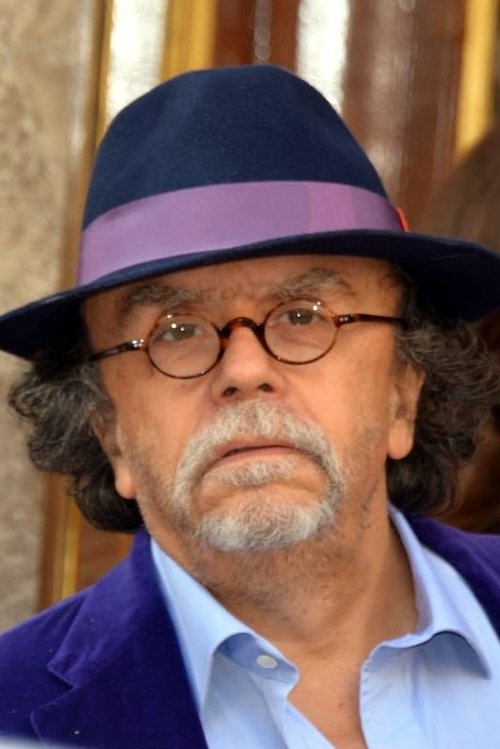
Jean-Michel Ribes
Jean-Michel Pierre Fernand Ribes
atau dikenal sebagai
Riwayat Hidup
Jean-Michel Ribes (born 15 December 1946, in Paris) is a French playwright, screenwriter, theatre director, film maker and actor.
Since 2002 he has been the managing director of the Théâtre du Rond-Point.
Between 1982 and 1984 Ribes had directed Merci Bernard and since 1988 works on Palace.
In 2008, Ribes had directed Batailles which he co-wrote with Roland Topor and next year became a director of the Un garçon impossible, a play by Petter S.
Rosenlund and Roland Dubillard's Les Diablogues.
In 2010, in Théâtre du Rond-Point he directed Les Nouvelles Brèves de Comptoir in which Jean-Marie Gourio had starred.
In 2011, he wrote and directed René l’énervé - Opéra bouffe et tumultueux, on the music by Reinhardt Wagner.
A year later, he returned to Théâtre du Rond-Point at which he directed play Théâtre sans animaux and Sébastien Thiéry's L’Origine du Monde in 2013.
Source: Article "Jean-Michel Ribes" from Wikipedia in English, licensed under CC-BY-SA 3.
0.
Info Pribadi
Peran Yang Di Mainkan Jean-Michel Ribes
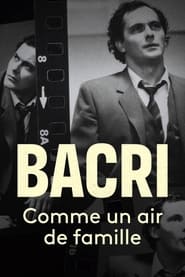 JeanPierre Bacri was never happy about...
JeanPierre Bacri was never happy about...Bacri, comme un air de famille 2022
Jean-Pierre Bacri was never happy about anything. But beyond the caricature of the grumpy man, from his apprenticeship years to his death in January 2021, this film tells the story of this quintessential Frenchman: a man turned towards others, an actor by accident, a moralist by vocation, who was left unaffected by flattery and false honors by success, and ready for all kinds of anger when it was necessary to speak out against injustice and stupidity. The film tells the story of how Jean-Pierre Bacri's life changed several times: from Algeria to France when he was eleven years old in 1962; from bank clerk to apprentice theater actor; from Pieds-noirs film star to screenwriter for Alain Resnais; and from Cannes playboy to Agnès Jaoui's mad lover, the most decisive encounter for his life as well as for his work
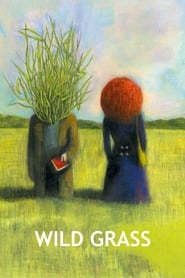 Marguerite loses her wallet and its...
Marguerite loses her wallet and its...Wild Grass 2009
Marguerite loses her wallet, and it's found by Georges, a seemingly happy head of family. As he looks through the wallet and examines the photos of Marguerite, he finds he's fascinated with her and her life, and soon his curiosity about her becomes an obsession.
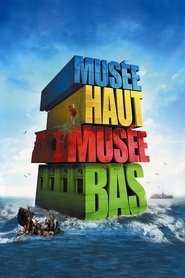 Un conservateur terroris par les plantes...
Un conservateur terroris par les plantes...A Day at the Museum 2008
Un conservateur terrorisé par les plantes vertes, une mère plastifiée pour être exposée, un ballet de Saintes Vierges, des gardiens épuisés par Rodin, un ministre perdu dans une exposition de sexes, une voiture disparue au parking Rembrandt, des provinciaux amoureux des Impressionnistes, touristes galopins galopant d'une salle à l'autre, passager clandestin dans l'art premier, Picasso, Gauguin, Warhol, ils sont tous là dans ce petit monde qui ressemble au grand, dans ce musée pas si imaginaire que ça, valsant la comédie humaine jusqu'au burlesque.
 Not long before World War I...
Not long before World War I...The Maiden and the Wolves 2008
Not long before World War I, in a French Alpine town near the Italian border, a pack of slaughtered wolves is delivered to local taxidermist Leon (Patrick Chesnais). A surviving black cub comes down from the mountains looking for his family, and is saved from discovery and certain death by Leon’s young daughter Angele, who releases him back into the wild. The Great War comes and goes, making local foundry owners the Garcins rich. Family patriarch Albert Garcin (Michel Galabru), who happens to be Angele’s godfather, has given a free lifetime’s lease of a shack in the hills to a gypsy woman (played in flashbacks by Elisa Tovati in which she’s seen, literally, having dances with wolves on stage). Her son Guiseppe (Stefano Accorsi), who appears to be slightly mentally handicapped, guards the wolves he’s befriended up there, especially the black pack leader he calls Carbone.
 In Paris six people all look...
In Paris six people all look...Private Fears in Public Places 2006
In Paris, six people all look for love, despite typically having their romantic aspirations dashed at every turn.
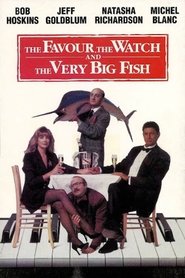 A farce Hoskins plays a photographer...
A farce Hoskins plays a photographer...The Favour, the Watch and the Very Big Fish 1991
A farce, Hoskins plays a photographer who specializes in religious pictures who searches for a model for Jesus. He does a favor for a friend and finds himself doing a voice track for a porno movie with Natasha Richardson. Hoskins finds his model for Jesus in Jeff Goldblum and a romantic triangle begins in which Goldblum finds adoring crowds believing him to be Jesus and then begins to believe it himself.
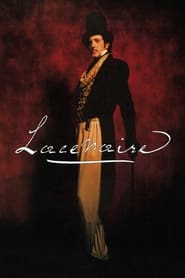 On 9 January 1836 Pierre Lacenaire goes to...
On 9 January 1836 Pierre Lacenaire goes to...The Elegant Criminal 1990
On 9 January 1836, Pierre Lacenaire goes to the guillotine, a murderer and a thief. He gives Allard, a police inspector, his life story, written while awaiting execution. He also asks Allard to care for Hermine, a lass to whom he has been guardian for more than ten years. In flashbacks, from the prison as Lacenaire writes, from Allard's study as he and Hermine read, and from other readers' memory after the book is published, we see Lacenaire's childhood as he stands up to bullies, including priests, his youthful thieving, his first murder, his brief army career, his seduction of a princess, and his affair with Avril, a young man who dies beside him.
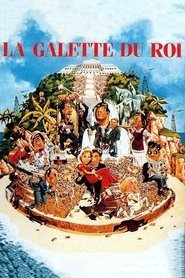 In this conventional broadly comic farce...
In this conventional broadly comic farce...La Galette du roi 1986
In this conventional, broadly comic farce of greed and royal matrimony, nearly bankrupt businessman Victor Harris is marrying Maria-Helena, a princess who comes with a dowry that is made up of one half of her island kingdom. Her father, the cowardly King Arnold III is counting on the money this marriage will bring him. The country is now almost bankrupt because of the king's gambling debts. As Harris and the king look forward to their illusory profits from the royal merger, other characters add some liveliness to the otherwise predictable story.
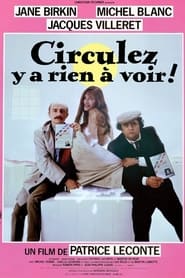 Inspector Leroux is investigating the owner...
Inspector Leroux is investigating the owner...Move Along, There Is Nothing to See! 1983
Inspector Leroux is investigating the owner of a contemporary art gallery Helen Duvernet who is suspected of being involved in trafficking of stolen paintings. He is both intrigued and attracted by the young woman, follows her everywhere and finally falls in love...
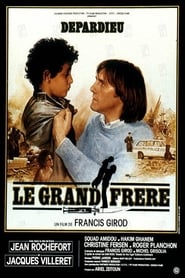 The plot in this story weaves...
The plot in this story weaves...The Big Brother 1982
The plot in this story weaves around like a New Year's reveler at four in the morning, heading first in one direction and then in another, with the intention of going home if things would just stop moving. Bernard (Gerard Depardieu) is a doctor whose Hippocratic oath was a hypocritic failure -- the not-so-good doctor kills his wife because she is having an affair, and he kills her lover too. Then he joins the French Foreign Legion. On his way to the former French colonies in Africa, the plane he is in crashes, and Rossi, a "friend" on the plane with some overweight in carry-on money, shoots Bernard and takes off, leaving him for dead. He is nursed back to life and health by friendly villagers and just his luck, he not only manages to make his fortune in Africa, he also nabs a French passport from a dying man who will clearly not need it anymore unless the Pearly Gates have a French guard.
 Rien ne va plus is a...
Rien ne va plus is a...Out of Whack 1979
Rien ne va plus is a series of comedy sketches of disparate quality, on the social, cultural, and political foibles that make the French, French. Various settings and character types are given a once-over, including pseudo-intellectuals, punk bikers, right-wingers, and patrons of a low-end cafe.
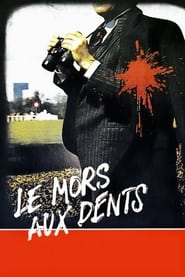 Three men with a penchant for...
Three men with a penchant for...The Bit Between the Teeth 1979
Three men with a penchant for gambling on the horses soon find themselves in trouble because of their addiction. Pierre (Michel Piccoli) is the math whiz who uses his talent for picking the winners. Charles (Michel Galabru) is the wealthy scrap-iron magnate who has embarrassing evidence on many prominent political figures. Loic (Jacques Dutronc) is the aspiring politico who seeks to further his career by any means possible. Charles approaches Loic and asks his political party for a loan in hopes of fixing an upcoming race....
 Three stories A solitary sailor falls...
Three stories A solitary sailor falls...Private Collections 1979
Three stories. A solitary sailor falls from his boat and washes ashore on a tropical island. While seeking rescue, he's found by a nearly naked woman who is playful and compliant. He decides to erase his signs of distress and remain on the island. What awaits? In the second, an adolescent searches for the words of a nursery rime he remembers bits of. His journey takes him into dreams, sexual awakening, and Oedipal fantasy. Third, a man of wealth in late-nineteenth century Paris hires a prostitute for the night. She's also cabaret performer and takes him to her room. He fears he's about to be robbed. What's her secret?
 A group of refractory and pacifist...
A group of refractory and pacifist...To Be Twenty in the Aures 1972
A group of refractory and pacifist Bretons is sent to Algeria. These beings confronted with the horrors of war gradually become killing machines. One of them did not accept it and deserted, taking with him an FLN prisoner who was to be executed the next day. International Critics Prize at the 1972 Cannes Film Festival. Copy restored in 2012
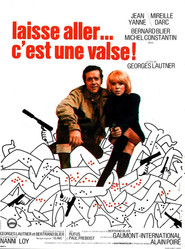 The day he is released from...
The day he is released from...Troubleshooters 1971
The day he is released from jail, Serge is expected by four killers sent by Count Charles Varèse assigned to make him confess where he has hidden the jewels stolen during his last stickup. On the other hand the police inspector who arrested him offers him protection on condition he gives him the same piece of information. Serge refuses and is about to be tortured by Varèse's henchmen when Michel, a friendly hood, comes to his rescue. His friendship will result in... a heap of corpses! —Guy Bellinger
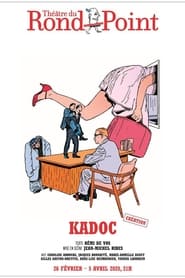
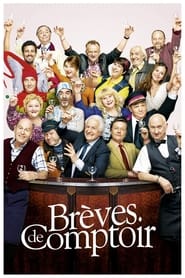 A small oldfashioned cafe in a...
A small oldfashioned cafe in a...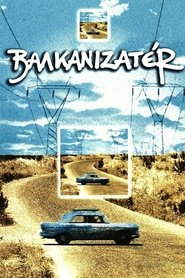 Two friends from a small Greek...
Two friends from a small Greek...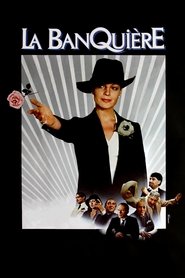 Ambitious Emma Eckhert successfully makes her...
Ambitious Emma Eckhert successfully makes her...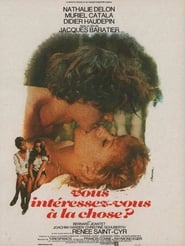 Its summer in the south of...
Its summer in the south of...